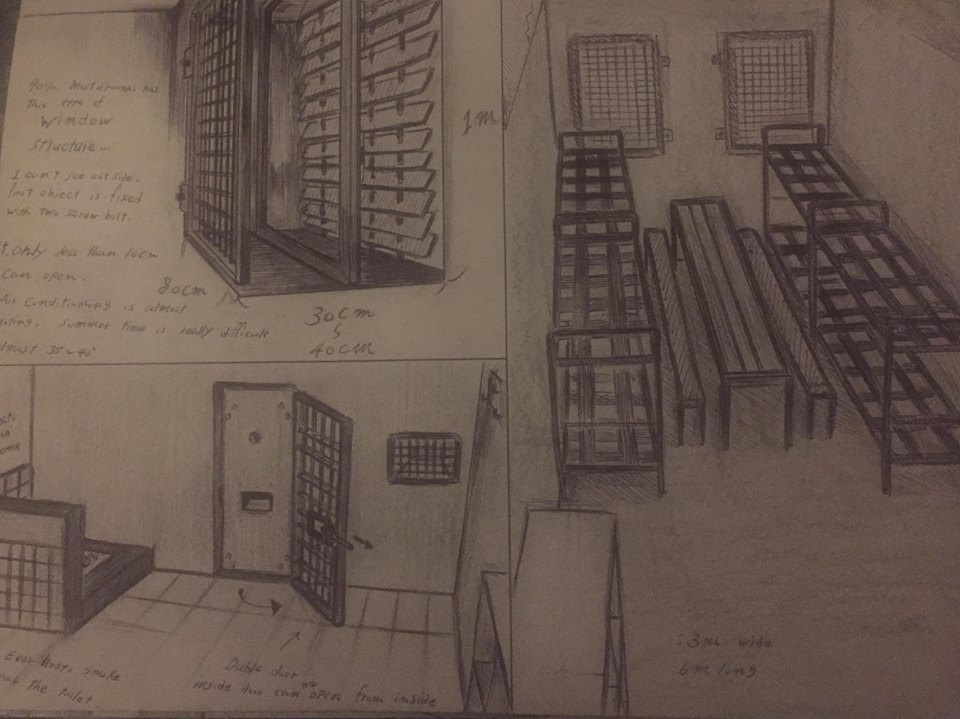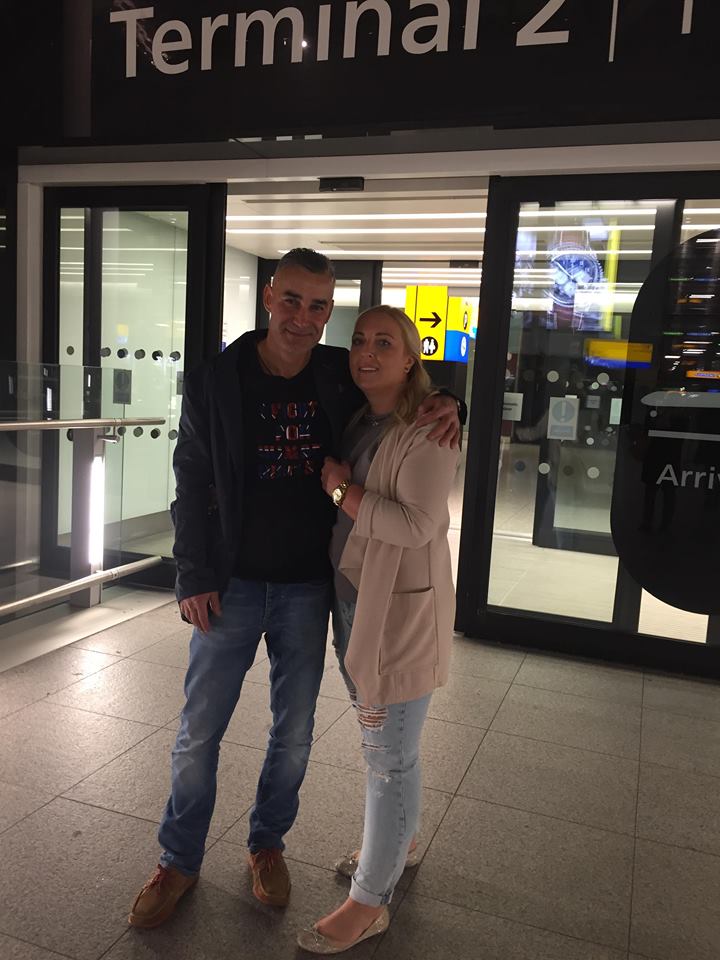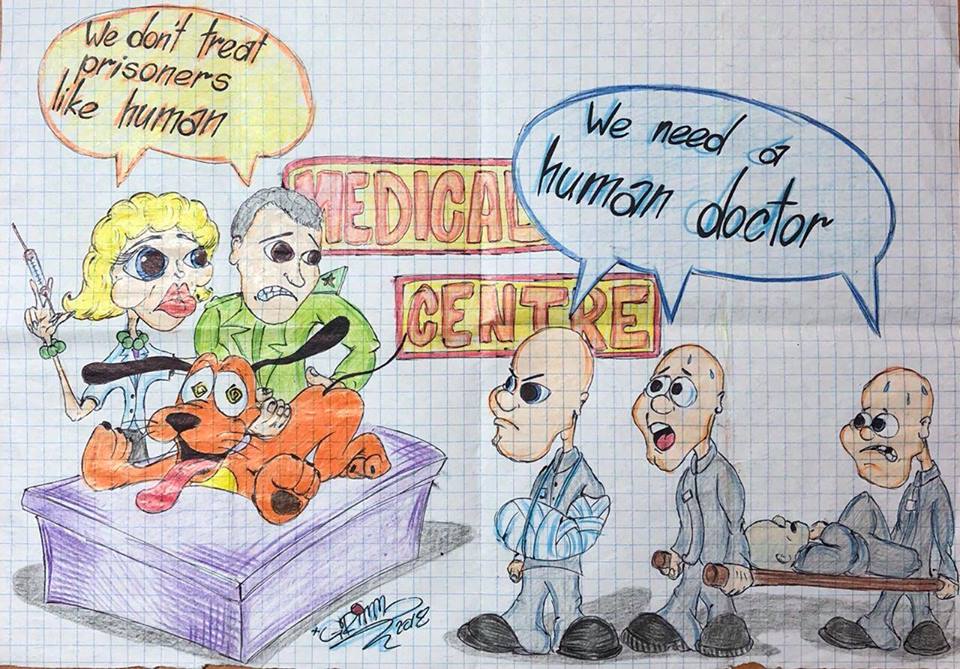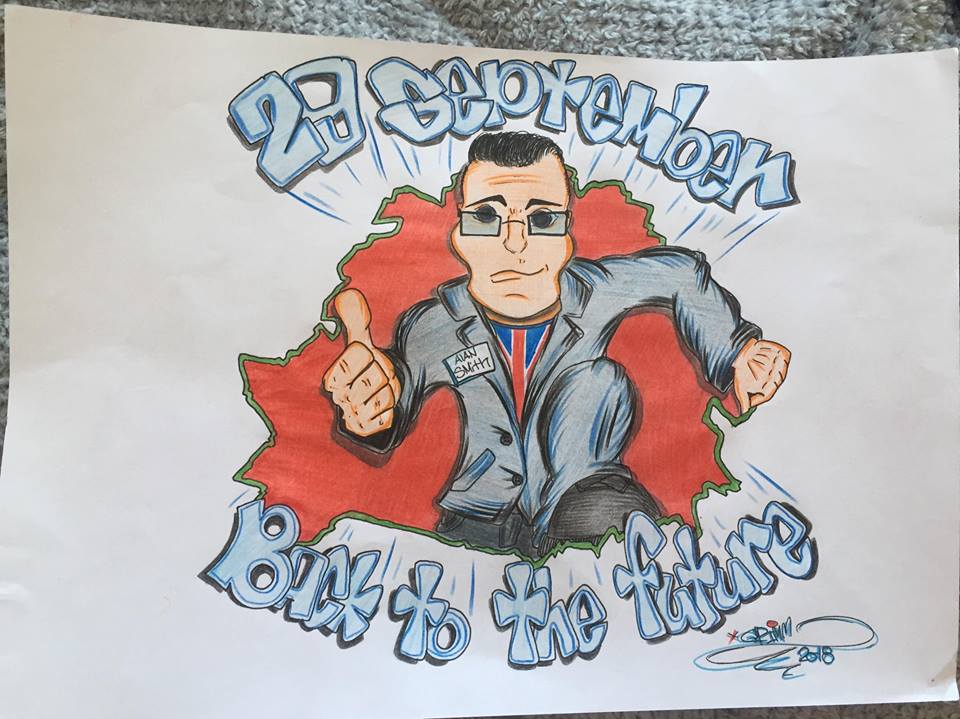

It was shocking, says British man about two years in Belarusian prison in exclusive interview to Belsat
Alan Smith was the head of a company that organized medical care for foreigners in other countries, including Belarus. According to Smith, he bought tickets for the Brest-Terespol train for a group of Iraqi citizens. The Belarusian court sentenced him to two years in prison for organizing an illegal migration channel. Smith spent 10 months in the remand prison No. 2 in Vitsebsk, and then served his sentence in the Vitsba-3 colony in the Vitsebsk region. He could not count on getting out on parole, as he refused to admit his guilt. On September 29, he was released. In an interview with Belsat, Alan Smith spoke about English speakers in prison, how to book a massage in the cell, and why the UK was not in a hurry to help him.
What was your first impression when you were put in a Belarusian prison?
It was shocking, I was completely confused. The conditions were terrible. At first I spent 14 months in the remand prison, and after the sentence I ended up in a penal colony. The conditions in them were similar, but in the colony, for the first time in 14 months, I was able to see the sky.
For 14 months I was never allowed to go out for a walk. All that time, I spent in a 4 x 2 meter cell with five other prisoners. The windows were closed, there is no ventilation, everyone smokes, there is an open toilet inside.
I was the only foreigner.
How did you communicate without knowing the language?
It was very difficult. When I wanted to say something, I used a dictionary. Fortunately, from time to time people who spoke a little English appeared in the cell. I had a problem with the prison administration — no one spoke English.
Were the prisoners friends in the remand prison cell? Did you manage to create a team?
Probably not, as they are very frightened by the regime in prison. They were afraid that some of the prisoners were ratting them out. This did not concern me, because I did not hide and said everything openly. In each cell there are informants who cooperate with the administration. Naturally, there was a camera and a microphone in the camera, we were being listened to.
Did the prisoners know who the informant was?
Of course not. I was the only prisoner who spent 14 months in the same cell. All the others spent in this cell about two weeks. This was done so that people could not create close ties and did not trust anyone. I immediately told everyone new that “we don’t talk about business”.
What changed when you got into a correctional facility?
At first it was like freedom for me. I could walk, open the window, the door, see the trees. The whole colony knew about me: this kind of prisoner did not get there every day.
I was the only prisoner in Belarus who did not sign an agreement about observing prison rules, and, theoretically, I should have been put in a punishment cell. I was also the only one in the colony who did not agree to have his hair cut.
What does life in a colony look like?
The barak was divided into 12 sectors, it was a special colony for former policemen, KGB, judges and officials. The administration was afraid that I was a spy, because I always asked a lot of questions.
How did you perceive the people who used to be on the other side — took part in the repression?
I think the authorities made a big mistake when they sent me there, but it was too late. All the prisoners were ordered not to talk to me, but it was difficult: about a thousand people were in the colony.
People who knew English were pressured separately so that they would not even approach me. However, I managed to collect a large amount of shocking information. I talked to the judges — there were about ten of them. At first they were afraid, but then they confessed that they did not pass the verdicts, but only announced them. The decision is made by the prosecutor, who calls and says, for example: “Sentence him to two years.”
In the case of judges and policemen, the decision on the verdict is made by the KGB, which has a special detention facility where they are put. Once, in the colony, a man met the judge who had sentenced him. And he said to him: “You know how our system works — I just announce the verdict.”
What was the relationship between prisoners and former judges and police?
It was bad. Nobody talked to them and did not trust them. Those who spoke to them were treated with suspicion by inmates. I was not not, because everyone understood that I was talking to them in order to receive information. I was pretty close with one judge, who received 14 years, and asked him openly how many innocent people he had put away. He smiled and said that those were not his decisions. And he had put away a thousand innocent people.
And how did they explain your case?
I was suspected of many things, and my case dragged on for a long time. According to the Belarusian tradition, when you are in the remand prison for more than a month, you cannot be acquitted, you have to get a sentence. The judge told my lawyer that if I confessed, they would let me out. But I refused. Moreover: according to Belarusian law, after serving half of the term, if you behave, you can be released.
I refused to plead guilty and served the entire term.
How did the administration and other prisoners comment on this?
The colony director received instructions from the court to force me to sign a confession. By the way, I was at war with the prison management every day.
What what made you act like that?
My principles. I was innocent, why should I plead guilty? The Belarusian authorities threw so many innocent people behind bars, including foreigners, tortured so many prisoners — and never paid for it. I decided to fight violations of the law and defend the rights of prisoners. I was the only prisoner who did this — and did it so that the whole world knew about it. I was not silent, I threatened them with a hunger strike.
What was the result of this behavior?
The management was afraid of publicity. It was me, for example, who made public the information that mass poisoning almost took place in the colony. After the administration wanted to unjustly punish other prisoners, I went on a hunger strike. I know that such protests and resonance affected them.
There were many businessmen, and not only them, in the colony. It was a colony for famous people. One of them was a personal pilot of Lukashenka. I tried to talk to him, but he constantly refused — he was ordered not to.
There were KGB officers there, and I managed to get very interesting information. I am not going to disclose it yet, so as not to harm them, so that they do not have problems for the rest of their lives — they already received 15 years. I also met with Taras Avatarov, who received a sentence for participating in the war in Donbas on the Ukrainian side.
What were the groups the prisoners were divided into?
There were two groups — the former policemen and officials who talked among themselves, and prisoners who followed their own rules, typical prison restrictions like “no touching the toilet”, etc. However, this did not have any connection with relations with the administration. In my colony, for example, there were no recidivists.
Were you treated violently by other prisoners?
On the contrary, I was respected, because I was the only person who opposed the administration. Many tried to avoid me, because they knew that I was not afraid of anything.
Your friends in jail were not afraid of contacting you?
I had many friends there, and even before my release they told me that they thought they would be punished. They were afraid to protest, but they knew that I was their only weapon against the system.
Did the prisoners have any particular traditions?
Yes, they still drink chifir (builder’s tea). If someone goes or returns from the punishment cell, the prisoners organize a joint drinking of chifir. I often joined them. The main currency in prison is cigarettes. You can order a massage for them, other prisoners can wash your clothes, etc.
What did your contacts with the guards look like?
I cannot talk about it, so as not to harm them. The guards did not want to talk to me — they were afraid that they would lose their jobs.
Did the British authorities support you?
This is a hard question. It was about politics: no one wanted to spoil relations with the Belarusian authorities because of me. But it cannot be said that they did not help at all: the representatives of the embassy visited me about ten times, they spoke with the administration of the colony. I received tremendous support from ordinary Belarusians — and I love them very much for that. I received a large number of letters and postcards, but unfortunately, a lot of correspondence did not reach me.
How did you manage for the world to see your caricature cartoons and sarcastic letters about prison conditions?
It was all illegal — I was helped to get them outside the colony. I said to the authorities of the colony: “Since you do not allow me to send letters, I will do it myself.”
They could not understand how, although they carried out an investigation — after all, there were several hundred people there.
Even a mobile phone could be smuggled into the colony – there was a whole chain of people who take part in such things. In my case, I didn’t even have to pay for it: people knew that I was like a splinter in the system and wanted to help me.
It was funny when I started the hunger strike: I said this at 16:00, and already at 17:00 the information about this was published throughout the country. The head of the colony received a call from the Department for the Execution of Sentences from Minsk asking how this was possible. I immediately had a full search — they wanted to find a hidden phone. And I told them that they would not find anything.
What did you hear at parting?
The prisoners were very upset because they knew that I was their only defender, they said they did not hope to meet anyone like me: other foreign prisoners just sat there quietly.
On Saturday, the colony director came to me — and this time he was very nice. The day before I said that I would not forgive him, and he would pay for everything that I experienced in prison.
The prison administration seemed to be disappointed that you did not admit guilt, and that they had to put up with you for so long?
Yes, that was the only reason why I had to serve two full years. And when they let me out, they took me to the car through the rear exit. I was not given the computer and mobile phone so that journalists would not find out about my release.
Then they wanted another 90 Euro from me for being taken to the airport. I told them that I can drive myself.
There was a similar situation at the airport — they took me to the local police station where all the policemen were nervous, because they had an instruction to prevent my contact with journalists.
Despite what I experienced, I met a large number of good people in Belarus, and the most unpleasant thing was that I had to leave them there. This was a sad day for me and for them.
Interviewed by Jakub Bernat






